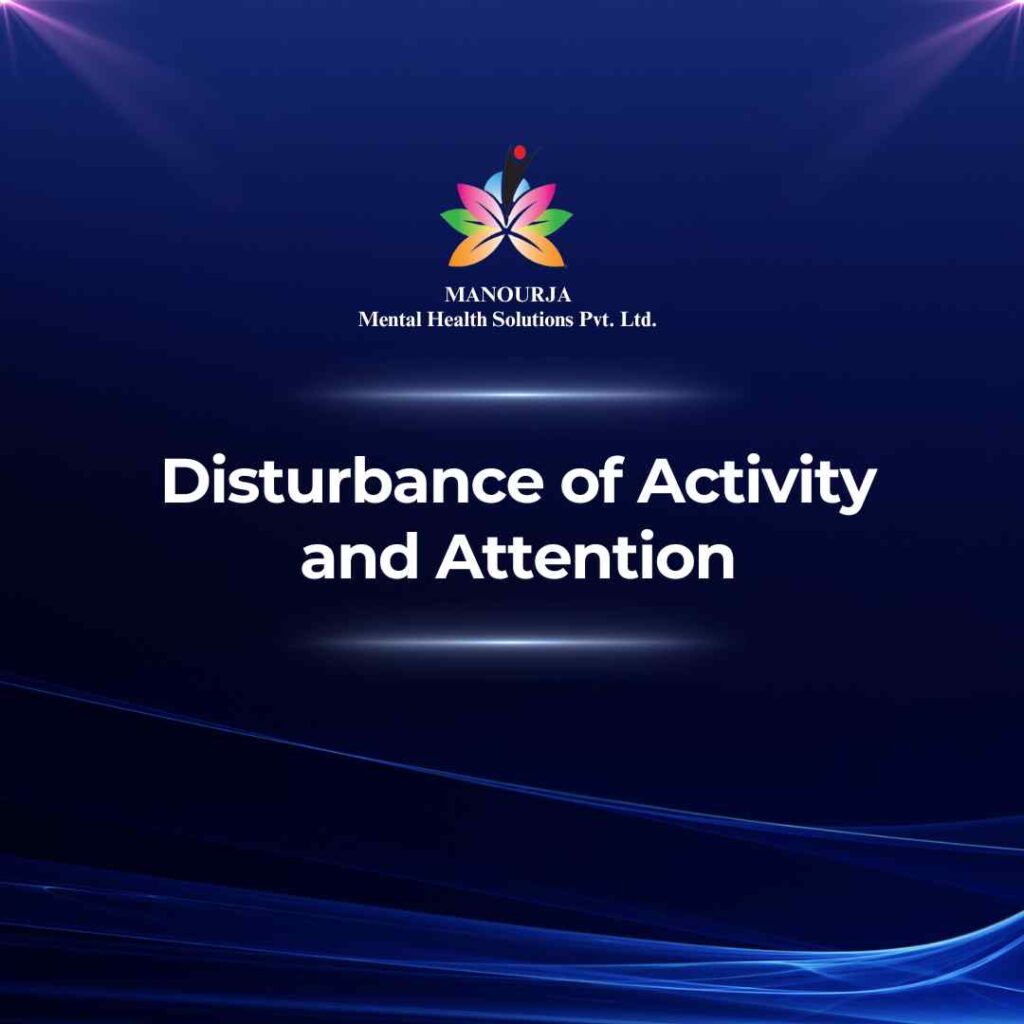Disturbance of Activity and Attention

Disturbance of activity and attention refers to a pattern of behavior that is characterized by an abnormal level of overactivity, impulsivity, and inattention. This condition is primarily observed in children and is often considered synonymous with or closely related to Attention Deficit Hyperactivity Disorder (ADHD).
- Inattention: Difficulty in sustaining focus, poor concentration, and a tendency to get easily distracted. This affects the ability to complete tasks, follow instructions, and engage in activities that require sustained mental effort.
- Hyperactivity: Excessive energy levels that are not appropriate for a person’s age or situation, often resulting in fidgeting, squirming in seats, or a compulsion to move around when it’s not suitable.
- Impulsivity: Acting without forethought or consideration of consequences, which can manifest in hasty decisions, interruptions in conversation, or impatience waiting for turns in activities.
Forms of Disturbance of Activity and Attention
This disturbance can manifest in various forms, commonly classified into three types based on the predominant traits:
- Predominantly Inattentive Presentation: Where inattention is more prominent than hyperactivity or impulsivity. Children with this form may seem to daydream, appear less interactive with their surroundings, and may be slow to respond.
- Predominantly Hyperactive-Impulsive Presentation: Characterized mainly by hyperactivity and impulsivity. Children may appear to be constantly ‘on the go’ and may exhibit behaviors such as excessive talking and difficulty remaining seated.
- Combined Presentation: Where both inattention and hyperactivity-impulsivity are equally present. This is the most common form and involves symptoms of both of the other types.
Treatment of Disturbance of Activity and Attention
The treatment for disturbances of activity and attention is multifaceted, aiming to reduce symptoms and improve functioning. It usually includes:
- Medications: Stimulants are the most common type of medication prescribed for managing symptoms of hyperactivity, impulsivity, and inattention. Non-stimulant medications are also available and might be used when stimulants are not effective or cause significant side effects.
- Behavioral Therapy: Behavioral interventions are crucial and can involve parents, teachers, and the children themselves. Techniques might include positive reinforcement for appropriate behaviors, consistent routines, clear expectations, and structured environments.
- Parental and School Support: Education for parents and school staff about the disorder can enhance their ability to provide support, structure, and interventions. Parent training programs teach strategies to manage behaviors effectively.
- Psychotherapy: For some children, counseling to help with emotion regulation, self-esteem, and social skills is beneficial. Techniques such as cognitive-behavioral therapy (CBT) are adapted for children to help them develop techniques to manage their behaviors and reactions.
- Lifestyle and Dietary Adjustments: Encouraging a healthy lifestyle with regular physical activity, sufficient sleep, and a balanced diet can also help manage symptoms.
The approach to treatment is typically personalized, often requiring adjustments over time based on the child’s response to interventions. Collaboration among healthcare providers, parents, teachers, and the child is crucial for effectively managing the disorder and supporting the child’s development and educational achievements.
At MANOURJA, we believe in the transformative power of counseling. Our experienced therapists offer a safe and supportive space where you can explore your thoughts, emotions, and challenges. Through personalized counselling sessions, we’ll work together to develop coping strategies, build resilience, and achieve lasting positive change. Discover the path to a healthier, happier you with MANOURJA counselling services.
MANOURJA Rehabilitation Services
At MANOURJA, we’re dedicated to helping you in rebuild your life, after difficult times. Our rehabilitation services focus on understanding what you need to move forward, whether you’re recovering from addiction, trauma, or any psychological – social challenges. We create personalized plans, that are all about helping you, regain your strength and find hope again. With a caring team by your side, you’ll have the support to make real progress and take steps toward a brighter, healthier future.
